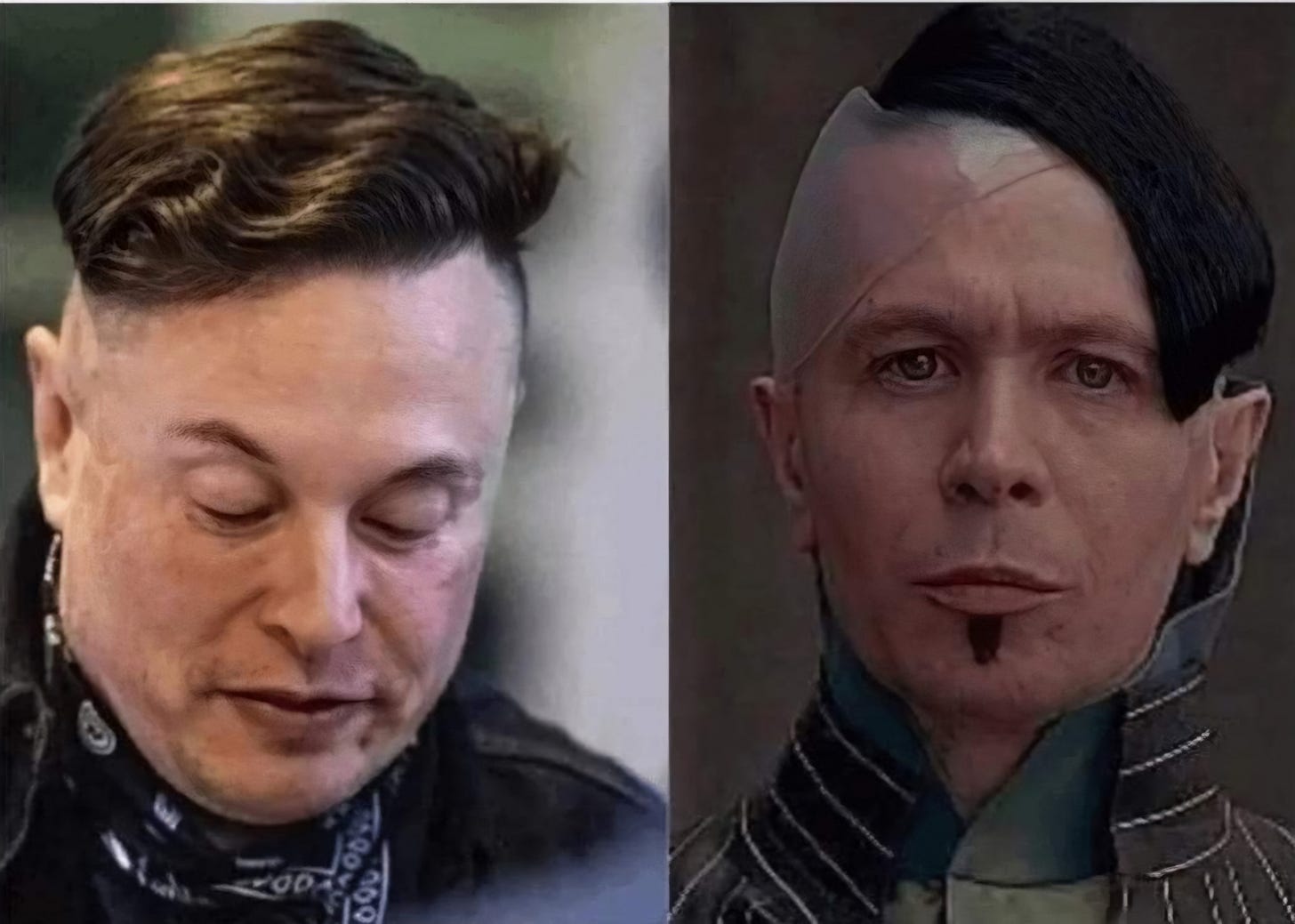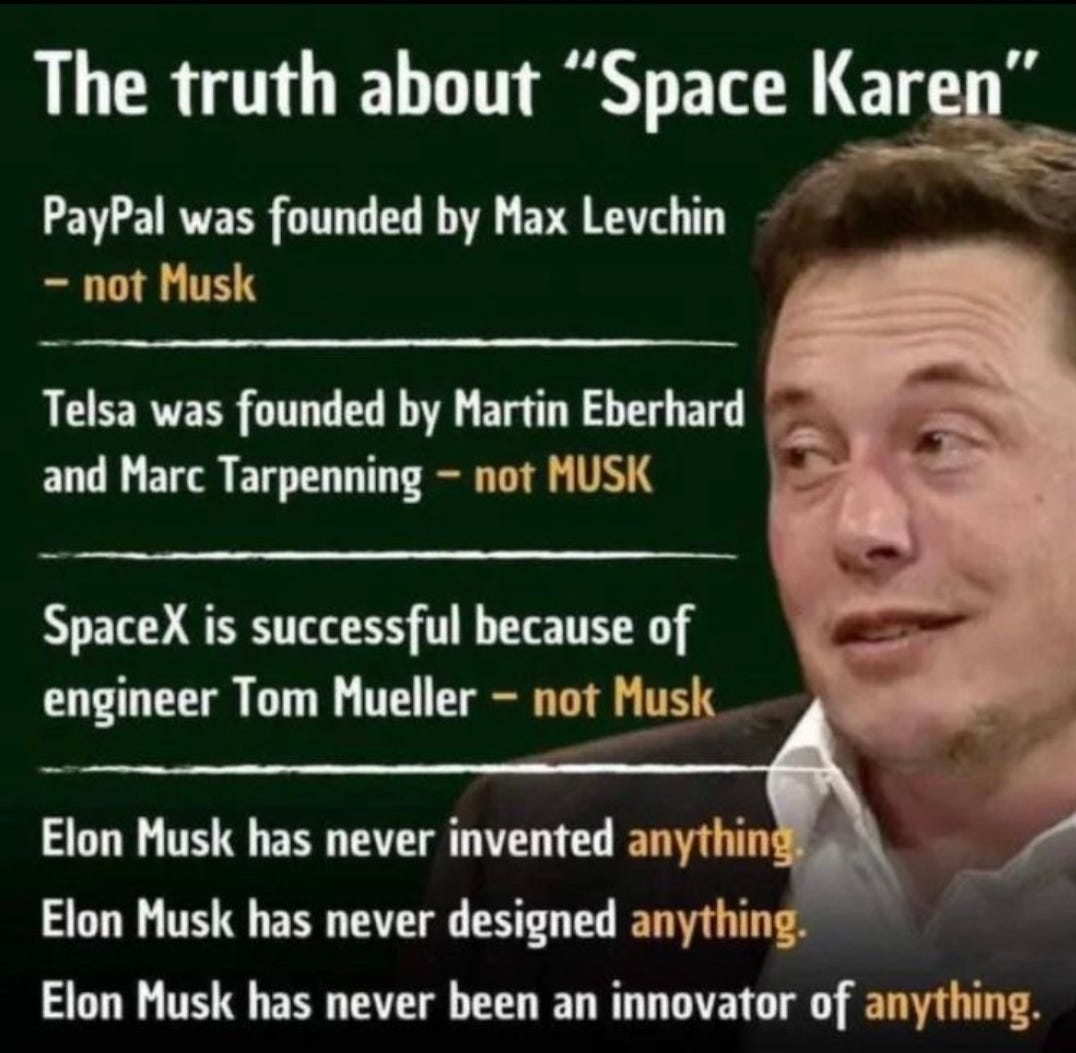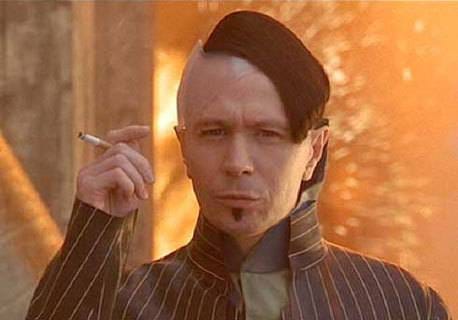The Tech Tyrant: From Tesla to Tyranny
A Threat to Global Democracy
Elon Musk is often hailed as a genius, a visionary, and even humanity’s saviour. But when you strip away the marketing spin, the carefully curated public persona, and the cult-like adoration from his followers, you’re left with a man whose actions are driven not by altruism, innovation, or even intelligence — but by ego and profit. Musk is a liar and a fraud, using a thin veneer of “saving humanity” and “free speech” to mask his true agenda. And the more power he amasses, the clearer it becomes that the plausible dystopia he’s enabling might very well be his ultimate goal — or one that he hasn’t yet realised he can achieve.
The Fraudulent Image of a “Genius Innovator”
Musk is not the founder of Tesla. Martin Eberhard and Marc Tarpenning are. He bought his way into the company and elbowed them out to claim the title. The same goes for many of his other ventures, where his contributions are far more about funding and marketing than actual innovation. He sells himself as the driving force behind cutting-edge technology, but the real innovators are the engineers, scientists, and experts who work under him — people who rarely get the credit they deserve.
Electric Vehicles: The Great Greenwashing
I want to be clear, I am all for working towards a more sustainable future, using renewable energy, and reducing our reliance on non-renewable. I also believe in transparency and this is why I have an issue with EVs. Yes, they are better for the environment while in operation. Let’s dig a little deeper.
Musk touts Tesla as the solution to climate change, but the data doesn’t support his claims. When you factor in the full lifecycle of an electric vehicle, from the mining of lithium and cobalt including the disgusting ways they are mined, to the energy used for charging and the disposal of batteries, EVs are probably no better for the environment than modern internal combustion engines. I do mean modern, new vehicles. The bigger issue is the amount of older vehicles still in operation worldwide.
EVs shift the problem rather than solve it. And yet, Musk’s followers lap it up, ignoring the environmental devastation caused by mining for EV batteries and the limited lifespan of these vehicles. The push for EVs as the ultimate green solution is a fallacy, a convenient lie that feeds Musk’s ego and bottom line, along with the billions he has got in government subsidies and will continue to get.

Twitter (Not X), Free Speech, and Hypocrisy
So when he started going on about buying Twitter, and I’ll be straight up here, I will not refer to Twitter as “X.” It’s a stupid rebrand that feels like something out of an 80’s sci-fi movie and X is the villain's name. So, with everything that went on over the platform buying, I had a feeling this would not be good. My bullshit detector was sounding the alarm.
Musk’s claim that the platform now champions free speech is laughable. Accounts critical of Musk and his ventures are regularly banned or shadowbanned. Bots have flourished, amplifying his agenda and drowning out dissent. And let’s not forget his bizarre stance on the word “cisgender,” claiming it’s a slur and limiting its use on the platform. This isn’t the behaviour of a free-speech champion; it’s the behaviour of a man desperate to control the narrative.
Ironically, even Musk’s own AI assistant, Grok, developed under his ownership of Twitter, has critiqued him for spreading misinformation; multiple posts have been up on Twitter stating this. While Musk champions the platform as a haven for free speech and open discourse, Grok flagged his actions as contributing to the very disinformation Musk claims to oppose. This AI-driven insight starkly contrasts Musk’s rhetoric, adding to the evidence that his control over Twitter is less about free speech and more about controlling the narrative.
NASA: A Critical Target in Musk’s Monopoly Game
Musk’s attacks on NASA are particularly insidious. NASA is more than space exploration; it’s a global beacon of innovation. From climate monitoring to oceanography to astrophysics, NASA’s contributions are unmatched. And unlike SpaceX, NASA shares its findings openly with the global scientific community, accelerating breakthroughs across borders. If Musk succeeds in weakening or dismantling NASA, he won’t just harm one institution, he’ll actively slow innovation for humanity as a whole.
He wraps himself in the cloak of innovation while actively stifling it. His attacks on NASA, calling it inefficient and wasteful, are a glaring example. Let’s not forget, that this is the same NASA that gave SpaceX billions of dollars in contracts, not to mention decades of foundational research and technology that SpaceX relies on. Musk criticises NASA’s spending while raking in government subsidies for himself, a staggering contradiction. I do mean raking it in, SpaceX has received billions in subsidies, while he criticises government waste and inefficiency and leads the public to believe that all of his billions go into his ventures.
He has already called for gutting NASA funding, after the billions he has raked in from government subsidies. Not only that, without NASA there would be no SpaceX, NASA prioritises science, exploration, and public interest over profit. Many of SpaceX’s advances (e.g., reusable rockets) build on decades of NASA-funded research. NASA’s goals include fostering international collaboration (ISS, and Mars programs), and not monopolising resources or technologies.
NASA plays a vital role in multidisciplinary research and innovation, contributing to climate monitoring, oceanography, astrophysics, and global collaboration through open data sharing and technology spin-offs that benefit humanity. Its missions, like tracking climate change and expanding cosmic knowledge, prioritise public good over profit.
In contrast, SpaceX operates as a profit-driven entity focused on commercial ventures like satellite launches and space tourism, with no obligation to share findings or prioritize basic science. If NASA were shut down or weakened, critical climate data and scientific collaboration would suffer, leaving a profit-motivated monopoly like SpaceX to dominate, stifling competition and sidelining projects with no immediate financial return.
Musk, Trump, and the Path to Authoritarianism
Musk’s growing alignment with Donald Trump is another massive red flag. Trump’s recent rhetoric — hints at abolishing elections, seeking revenge on enemies, and destroying constitutional safeguards — paints a clear picture of authoritarian ambition. If Trump consolidates power, Musk’s influence over critical sectors like space, communications, and technology could skyrocket. Starlink, SpaceX, and even Neuralink would become tools in an authoritarian regime, with Musk positioned as its technocratic enabler.
Let’s not ignore the Department of Government Efficiency (DOGE) — a blatant Musk-inspired nod to Dogecoin, and another avenue for him to exert influence. Under the guise of streamlining government, this advisory body could pave the way for policies that benefit Musk’s ventures while eroding democratic accountability.
There is a clear conflict of interest in running DOGE, and Trump and Musk making it an unofficial government department with an “advisory” role only, is just a smoke screen. This way it won’t have the usual government oversight, it will take a lot of time and money to contest anything through the legal system, allowing their agenda to be pushed through. The levels of corruption this will allow will be staggering. The issues are just beginning to line up with the NASA one highlighting the conflict of interests.
It is no coincidence he has linked with Trump, throwing millions at the campaign and using Twitter to get Trump re-elected. He has seen the cult-like fervour Trump’s supporters back him with, and he wants a base like that, he is well on his way to getting it, just check the comments on his Twitter posts.
Starlink and Space Weaponisation
Starlink already gives Musk control over a global communications network. It’s a tool he’s already used to influence conflicts, as seen in Ukraine. Now imagine this same network weaponised — satellites outfitted with military capabilities, able to disable enemy satellites, block communications, or strike Earth-based targets. SpaceX’s rapid satellite deployment capabilities mean Musk could achieve this faster than any nation could react. A Starlink monopoly wouldn’t just cement his dominance in space — it would give him unparalleled geopolitical power.
Neuralink: The Ultimate Tool for Control
Neuralink, Musk’s brain-computer interface, is marketed as a revolutionary medical device. But in the wrong hands, it’s the ultimate surveillance tool. A government — or corporation — with access to Neuralink could track, monitor, and even influence thoughts. The potential for abuse is staggering. Under an authoritarian regime, Neuralink could become mandatory and justified as a public safety measure. Imagine a world where dissent is impossible because it’s erased from your brain.
Musk’s Robots: Another Piece in a Dystopian Puzzle
Musk’s advancements in robotics add another layer to the alarming consolidation of power under one man. With Tesla’s Optimus robot and its integration of AI, it’s clear Musk envisions a future where robots aren’t just household helpers — they’re integral to society, capable of performing complex tasks with minimal human intervention. While marketed as a leap forward in technology, the potential for misuse is staggering.
Imagine a world where robots are controlled via Neuralink or connected to a global Starlink network. Musk’s influence over AI development and his legal actions against competitors like OpenAI indicate a desire not for collaboration, but for control. If one man wields unchecked power over AI, robotics, and communication, the risk of creating a dystopia becomes dangerously real. These robots, if weaponised or used for surveillance, could act as enforcers of authoritarian policies, silencing dissent and controlling populations in ways previously relegated to science fiction.
The Monopolistic Playbook: Dismantling Competition
Musk’s strategies extend far beyond innovating within his industries. His attempts to dismantle competitors, whether through lawsuits, public smears, or leveraging his platforms, suggest an active pursuit of monopolistic dominance. Consider his lawsuit against OpenAI — an organisation he initially helped found — which he now attacks as a threat to his own AI ventures. Musk’s actions highlight a pattern: when he can’t own or control a competitor, he seeks to neutralise it.
The same goes for NASA, mainstream media, and rival social media platforms. Musk’s disdain for traditional news outlets and his claim that “X is the news now” and “You are the news now” signals his ambition to centralise information under his control. His followers, who amplify conspiracy theories and extreme views, are being groomed to believe they are the truth-bearers. This isn’t just dangerous; it’s a foundational step in creating an echo chamber of misinformation, weaponised for Musk’s benefit.
The Plausible Dystopia
This isn’t just paranoia, because I’ve long considered all of this, but Musk’s action and what has occurred so far since the election results, before Trump even takes office, making it seem less like paranoia and cause for major concern.
The elements of this dystopia already exist: Starlink controls communication. SpaceX dominates space. Neuralink could control minds. Robots are controlled by one man.
Musk’s proximity to authoritarian leaders like Trump positions him perfectly to consolidate this power.
If Trump dismantles the Constitution, there’s little to stop Musk from stepping into a leadership role himself. The idea of a Musk dictatorship sounds like sci-fi, but the tools are there. Starlink satellites could disable enemy infrastructure. Neuralink could control populations. SpaceX could weaponise space. And with no democratic oversight, with access to the largest military power the world has ever seen. Musk could wield this power unchecked.
Even a united global resistance would struggle to oppose this dystopia. Musk’s technology already outpaces regulation, and his influence continues to grow. The question isn’t if he could achieve this — it’s whether he realises the opportunity or is already working toward it.
Humanity’s Saviour or Destroyer?
If Musk’s self-proclaimed mission to “save humanity” was genuine, he would focus on saving the only planet humanity can survive on, Earth.
And it’s not like he couldn’t make this profitable — because let’s face it, Musk doesn’t do anything unless there’s money in it. Investing in solutions like cleaning up the oceans, tackling climate change, or exploring sustainable underwater cities would not only advance humanity but also align with Musk’s supposed vision. Instead, Musk throws millions away on ventures that either feed his ego or directly benefit him financially.
Here’s the most glaring flaw in Musk’s “saviour of humanity” narrative: a Mars colony will not survive without a healthy Earth base to support it. That’s a fact. Colonising Mars is at least a decade away, and terraforming Mars — if it’s even possible — is likely centuries away. Without Earth’s resources, infrastructure, and supply chains, any Mars colony is doomed to fail. I’m more inclined to listen to actual scientists about this than Elon Musk.
And let’s not forget humanity’s track record. The audacity to think we should become a multi-planetary species when we can’t even take care of our planet is staggering. The idea that we have the “right” to terraform Mars, disrupting a new world when we’ve already destroyed so much of our own, is laughable. Musk’s plan to “save humanity” is nothing more than an escapist fantasy designed to distract from the real, hard work of saving Earth.
Elon Musk sells himself as humanity’s saviour, but his actions tell a different story. From silencing critics to undermining democratic institutions to monopolising critical technology, Musk’s path is one of domination, not innovation. The plausible dystopia is no longer far-fetched, it’s a looming reality that demands our attention before it’s too late.
Humanity’s future cannot be left in the hands of one man. It’s time to question the narrative, connect the dots, and ensure that power and progress remain in the hands of the many, not the few.
This is an opinion piece based on years of observing Elon Musk’s ventures, words, and actions, supported by publicly available evidence. While Musk’s contributions to technology and innovation are undeniable, this article examines the potential consequences of his growing power and influence.
1. Tesla existed before Elon Musk: Founders on how they pitched the idea
2.
3. https://en.wikipedia.org/wiki/Elon_Musk
5. Tesla Inc.
6. Musk spurns subsidies, after SpaceX sought them out — POLITICO
7. SpaceX wins big share of $9.2B RDOF broadband subsidy — SpaceNews
8. SpaceX secures new contracts worth $733.5 million for national security space missions — SpaceNews
9. Pentagon picks SpaceX, Blue Origin and ULA for $5.6 billion launch deal | Space
10. Human Landing System — Wikipedia
11. Commercial Crew Program — Wikipedia
13. Neil deGrasse Tyson Slams Elon Musk’s Plans for Mars Colonization















Really well written piece JD, nice work